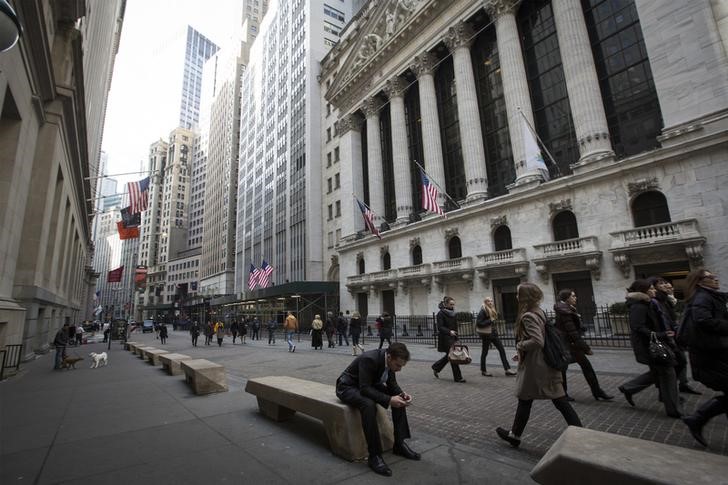By Geoffrey Smith
Investing.com -- U.S. stock markets opened lower but quickly rebounded on Thursday after another record-breaking rise in initial jobless claims underlined the scale of the damage being wrought on the U.S. economy by the Covid-19 pandemic.
Another 6.65 million people filed for unemployment benefits last week, over twice as many as the 3.3 million who claimed a week earlier (the number was revised up by 20,000). In all, 6% of the U.S. workforce have hit the jobless rolls in just two weeks.
By 10:05 AM ET (1405 GMT), the Dow Jones Industrial Average was up 62 points, or 0.3%, at 21.006 points. The S&P 500 and the Nasdaq Composite were up 0.7% and 0.5%, respectively. All three had been indicated to open sharply higher before the report was released.
Oil and gas stocks were the big outperformers, tracking a sharp rebound in crude prices after President Donald Trump predicted a peace deal to end the crude price war within a few days. Trump, who has spoken to both Russian President Vladimir Putin and Saudi Crown Prince Mohammed bin Salman in the last few days, is due to meet with U.S. oil company bosses on Friday.
By 10:05 AM ET, U.S. crude futures were up 8% at $21.94, having earlier risen as much as 11%.
Occidental Petroleum (NYSE:OXY) stock rose 6.4%, while Exxon Mobil (NYSE:XOM) stock rose 2.3% and Chevron (NYSE:CVX) stock rose 4.3%.
Luckin Coffee (NASDAQ:LK) stock fell as much as 81% after the Chinese coffee house chain said it had suspended its chief operating officer and withdrew its last two quarterly reports while it investigates suspicions of "misconduct".
Short-seller Muddy Waters Research had called the stock a fraud in January after evaluating anonymous research that suggested the company’s sales were inflated.
Starbucks (NASDAQ:SBUX) stock rose 3.8% on the prospect of a major competitor in China leaving the market.
Zoom Video (NASDAQ:ZM) stock fell another 12.4% on growing concerns about its data privacy policy, and about its valuation, after an uncontrolled surge in demand on the back of the Covid-19-driven boom in working from home.
The company reported earlier that average daily users had soared to 200 million from a maximum of 10 million before the crisis. It didn’t break out how many of them were using the premium, paid-for service.
Carnival (NYSE:CCL) stock opened sharply lower but recovered somewhat after the cruise line operator struggled to find buyers for its equity in its $6 billion recapitalization. The company placed $500 million in new stock at $8 a share, having initially wanted to sell $1.25 billion. The result is that the company emerges from the recap more leveraged than it intended to be. On the upside, it managed to sell the senior debt tranche at a yield of around 11.5%, a full percentage point less than initial reports suggested was likely.
By 10:05 AM ET. it was down 4.8% at $8.38 - well above premarket indications of around $7.60.
